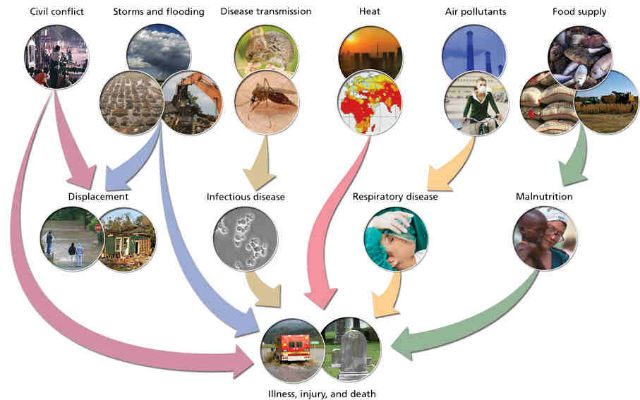SUMMARY
This is AI generated summarization, which may have errors. For context, always refer to the full article.
 More than 2,000 years ago, the Greek physician Hippocrates, regarded as the Father of Medicine, gave us medical doctors this essential reminder:
More than 2,000 years ago, the Greek physician Hippocrates, regarded as the Father of Medicine, gave us medical doctors this essential reminder:
“Whoever would study medicine aright must learn of the following subjects. First, he must consider the effect of the seasons of the year and the differences between them. Secondly, he must study the warm and the cold winds, both those which are in common to every country and those peculiar to a particular locality. Lastly, the effect of water on health must not be forgotten.” (Airs, Waters, and Places, 400 BCE)
Indeed, the changing environment impacts greatly on human health, and that is why we in the health sector strive to make health systems more resilient and prepared in responding to emerging health challenges. For instance, we investigate the causes of air and water pollution in order to devise ways to prevent lung disease, diarrhea, and toxic chemical poisoning.
We are also putting in place robust surveillance systems that monitor disease trends as well as their environmental determinants. Another thing we do is strengthen the delivery of health services at the community level and equip our health workforce so that they can manage diseases resulting from dire environmental conditions.
Doing no harm on people and planet
But more than treating illnesses, Hippocrates also left us with perhaps the most important commandment of medicine, which is embedded in the oath that bears his name and that we doctors recite at the beginning of our career: First, do no harm.
This is also the mantra of our organization, Health Care without Harm (HCWH), and we believe that this tenet applies not only in the direct provision of care to patients, but also in the entire health sector’s interaction with the surrounding physical environment. Therefore, our organization’s goal is to transform the health sector worldwide into one that does no harm on both people and the environment.

For nearly two decades, we have been working with health professionals and healthcare institutions, as well as governments and inter-governmental organizations around the world to help eliminate harmful practices such as poor waste management, use of toxic chemicals, unhealthy food choices, and reliance on polluting technologies, and encourage them to shift to safer and healthier alternatives. For example, one of HCWH’s major achievements is the total elimination of mercury in healthcare settings.
Climate change and human health
We are adopting this similar “Do-No-Harm” approach as we bring the issue of climate change to the health sector.
The British medical journal The Lancet called climate change “the biggest global health threat of the 21st century.” Sadly, the health effects of climate change are already being experienced in many communities worldwide – from changing patterns of infectious disease spread to increasing burden of disease and injury as a result of extreme weather events, such as Super Typhoon Haiyan which hit central Philippines almost exactly a year ago and claimed more than 5,000 lives. Indeed, the health sector is one of the first to bear the brunt of climate change and its consequences. Ultimately, people do suffer and human lives are lost prematurely and unnecessarily.
Global evidence, as documented in the reports of the United Nations Intergovernmental Panel on Climate Change (IPCC), clearly demonstrates that climate change is the product of a fossil-fuel driven economy. The health sector, however, cannot remain in just treating its signs and symptoms, and instead should play a critical role in the elimination of its root causes. Fortunately, some health organizations from different parts of the world are setting an example, as they begin to veer away from short-term cures and rather turn towards more preventative measures.
Handing off from fossil fuels
For example, in June 2014, the British Medical Association became the first healthcare organization in the world to transfer its fossil fuel investments to clean energy. This success happened because of a strong movement that was started not by experts, but by a group of medical students called “Healthy Planet UK.” This power shift in the United Kingdom’s health sector then sparked the beginnings of a growing movement around divestment by healthcare organizations from fossil fuels and investment in healthy energy.
Earlier in September this year, after enough pressure from the general public as well as its own members, the Health Employees’ Superannuation Trust Australia (HESTA), which is a retirement fund for healthcare workers, also announced a restriction on all future investments in thermal coal.

More than a month ago, on the day before the United Nations Climate Summit in New York, the Chief Executive Officer of Gundersen Health Systems, which is a network of hospitals and health facilities based in Wisconsin, USA, announced that they will also be freezing future corporate investments in fossil fuels, which equate to roughly $20 million, as part of its efforts to promote sustainability in healthcare.
Sustainable hospitals and other healthcare facilities
Divestment from fossil fuels however is not the only way the health sector can contribute to climate solutions. For instance, Gundersen made a step further by aiming to become a world leader among healthcare institutions in achieving net zero carbon emissions. They are currently deploying renewable energy technologies to its network of facilities.
Gundersen is also part of another of HCWH’s flagship projects, Global Green and Healthy Hospitals, which is a worldwide network of nearly 9,000 hospitals and health centers that have committed to reduce their carbon footprint through doable alternatives in the management of chemicals, wastes, and water, among others.
Several hospitals in the Philippines have also begun adopting sustainability as a key principle in healthcare. For example, hospitals of the Saint Paul de Chartres Health Care Ministry such as the Perpetual Succor Hospital in Cebu City and Maria Reyna Xavier University Hospital in Cagayan de Oro City have for years already been using low-cost green technologies for generating energy and managing wastes.
Of all places, hospitals and other healthcare facilities, which are at the core of the business of healing, should serve as models of sustainability to other sectors.
Climate-friendly policies are health policies
Finally, as part of the health sector’s contribution to doing no further harm on the climate, HCWH, along with other partners in the Global Climate and Health Alliance (GCHA), is also mobilizing health professionals to advocate for climate-friendly policies at the national and global levels. In 2011, the GCHA launched the Doha Declaration on Climate, Health, and Well-being, which laid down the health case for global climate mitigation and adaptation.
Today, its members, including HCWH, are engaging with national healthcare organizations in order to begin negotiations with other sectors for the protection of health in the face of climate change. In the coming months, HCWH’s Healthy Energy Initiative will be launching a dialogue with the Philippine health sector on the health implications of energy options, particularly on the health effects of coal and other fossil fuels as well as the health benefits of renewable energy alternatives.
At the end of the day, climate-friendly policies are, by and large, health policies as well.
So, to conclude, what does the Hippocratic Oath mean in the context of climate change?
First, do no harm by building resilient health systems.
Do no harm by divesting from fossil fuels.
Do no harm by investing in clean and healthy energy.
Do no harm by pushing for climate-friendly and healthy policies.
Do no harm and instead, create more health.
– Rappler.com
Dr Renzo Guinto is the campaigner of the Healthy Energy Initiative of Health Care without Harm Asia. This article is adapted from the speech he delivered during the conference entitled “NEXUS 2014: A Global Gathering on Climate, Environmental Health, and Justice” held at the University of California Irvine on October 6-8, 2014.
iSpeak is Rappler’s platform for sharing ideas, sparking discussions, and taking action! Share your iSpeak articles with us: move.ph@rappler.com
Tell us what you think about this iSpeak article in the comments section below.
Add a comment
How does this make you feel?
There are no comments yet. Add your comment to start the conversation.